In 2014, victims of the Boko Haram insurgency kept arriving at St. Theresa’s Cathedral in Yola, northeastern Nigeria, to seek shelter until there was no longer room for more.
Right about when the building became overcrowded, the support from organisations who helped sustain them also started to cease.
No one knew what to do.
Then, Most Rev. Stephen Dami, the Catholic Bishop of Yola dioceses, had an idea. It was to become a property developer and build new homes for the IDPs. Today, they all have permanent homes due to his efforts in collaboration with other organisations.
According to a report by the United Nations Development Programme (UNDP), since 2009, the insurgency in northeastern Nigeria has directly resulted in the deaths of approximately 35,000 people.
When northern Adamawa was overrun by the Boko Haram insurgents in 2014, thousands of IDPs poured into Yola from places like Madagali, Michika, Mubi, Hong, Gombi, and even some regions of Borno, the Bishop told HumAngle.
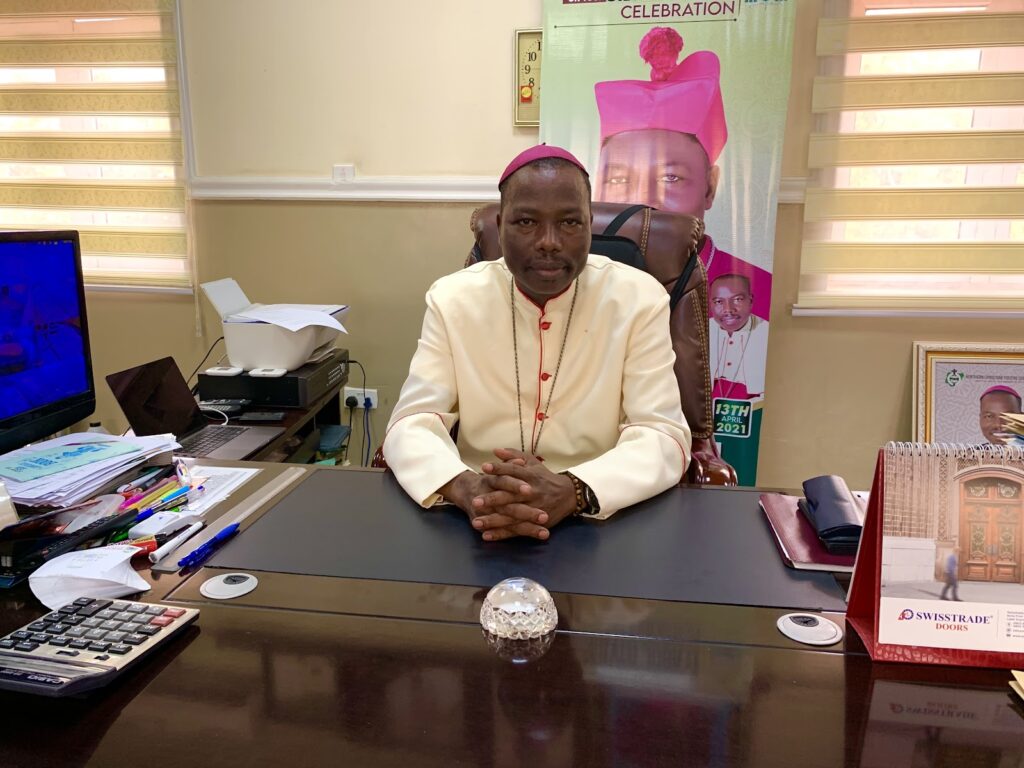
“Some of them knew no one in Yola and were in dire need of shelter, food, and other necessities. So the cathedral played host to them, allowing them to occupy the schools, church premises, training centres, and other places. From 2014 to 2019, we took care of their feeding, shelter, and health,” he said.
Later, the organisations which supported the cathedral to take care of the IDPs began to withdraw when they experienced a shortage of resources.
“Even the IDPs were tired of staying in a camp, so to settle them permanently, I decided to look for land and build a place for them. I wanted the houses to be erected across the bridge because it leads to their hometowns.”
Salama housing
In 2014, at least 1.5 million people were said to have been displaced by Boko Haram insurgents since May 2013, when the federal government first declared a state of emergency in the northeastern states.
Tabitha Dali, 43, was among the first beneficiaries of the free services at St. Theresa’s Cathedral, Yola. After fleeing Madagali in Adamawa in 2014, she first went to neighbouring Cameroon with her siblings.
There, they spent a couple of days before making their way back to Nigeria. This time, they went to Yola, the Adamawa State capital, and sought refuge at St. Theresa’s Cathedral.
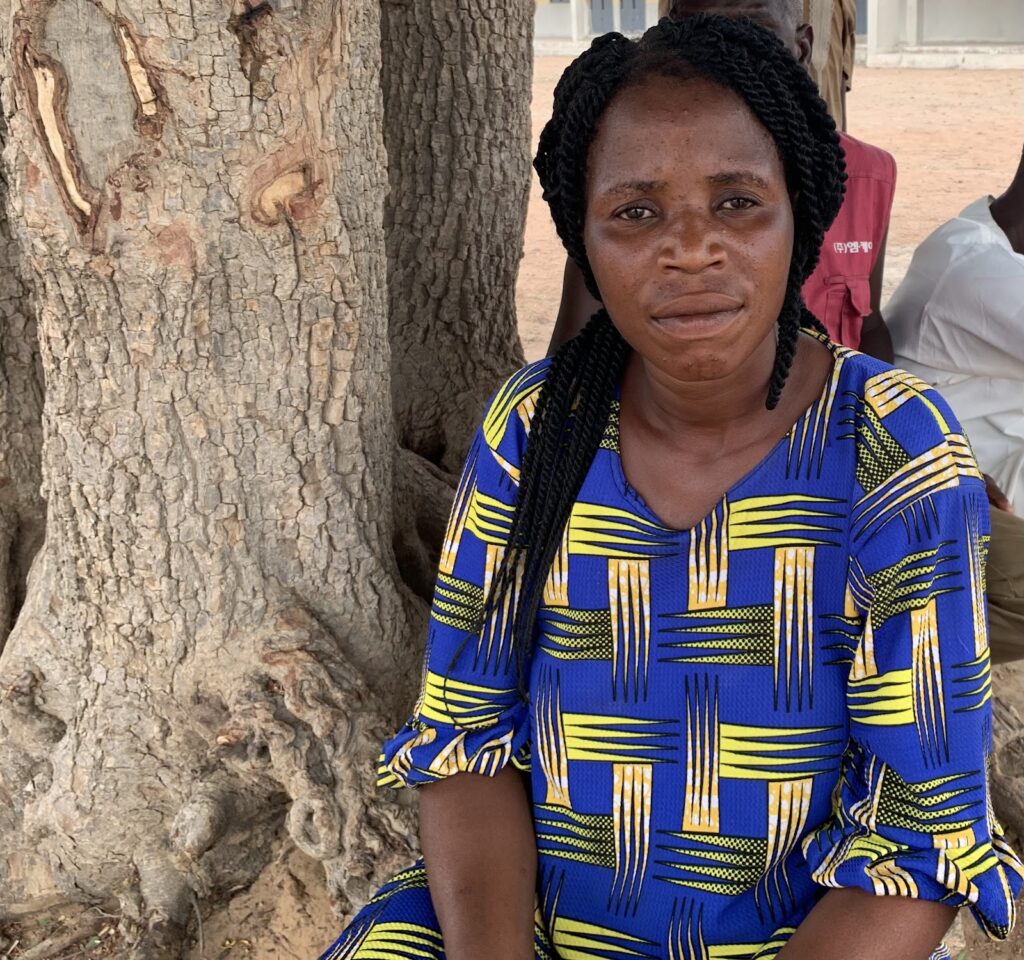
After a while, many of the displaced persons who camped at the cathedral camp left when some measure of peace returned to their hometowns. But, having lost everything, Tabitha and her family remained. Fortunately for them, they received assistance from the cathedral until Salama Housing Estate was built. They were not the only ones. Several other vulnerable people remained at the cathedral.
“I met the state governor and appealed for land. He gave me ten hectares of land. The district head also approved my project. I shared my plan with the organisations that had been assisting me with the IDPs, and together, we began drafting proposals for the project,” Bishop Dami explained.
Some of these organisations included OXFAM and other Christian bodies such as the Catholic Archdiocese of Lagos, St. Vincent de Paul Society in Lagos, and several more.
Eventually, 86 houses were erected. Each building has a kitchen, a living room, a bedroom, toilets and bathrooms to accommodate 86 households. It also provided school and water points.
“The IDPs had children, so we built a nursery and primary school to accommodate not just the children of the IDPs but also members of the host community. We also built a clinic that is now coordinated by the state primary health care,” he added.
While the wards of the host community are also beneficiaries of the IDP free school programme, members of the host community have access to the free boreholes in the estate.
Though the initiative is championed by Christians, everyone is entitled to freedom of worship because the displaced persons come from different religious backgrounds. In fact, a mosque and church were built side by side for occupants.
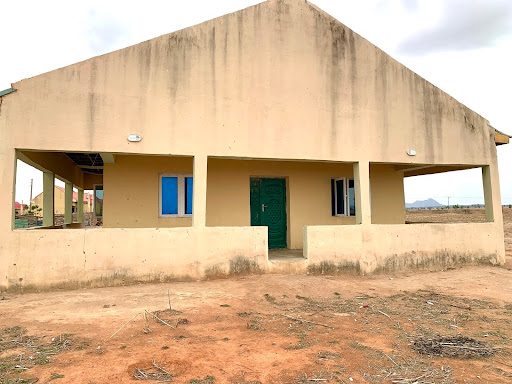
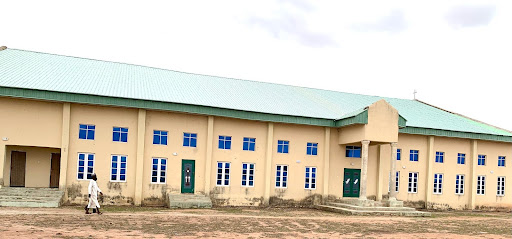
When the homes were completed in 2021, the people were able to move from St. Theresa’s Cathedral to the permanent site. The projects were then commissioned by the governor of Adamawa State, Umaru Ahmadu Fintiri, alongside some religious leaders.
But there is one simple rule – the houses are free and must not be sold by the IDPs.
“They can live for the rest of their lives there and hand it over to their generations, but they must not sell it. And if they intend to return to their towns permanently, they are to hand over the keys to us so that we will give them to those who don’t have houses,” Bishop Dami told HumAngle.
How they arrived
Mary Daniel, 42, fled Askira Uba in Borno State with her seven children after escaping a terror attack in 2014. Her husband was not at home when the attack began, so she took the children to Numan in Adamawa to stay with one of her sisters.
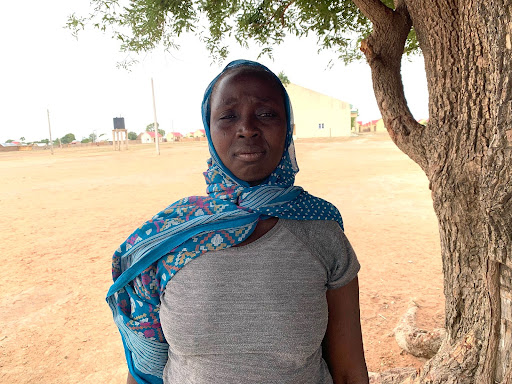
However, their stay was short-lived due to farmer-herder clashes in 2018. Another tragedy struck – their house in Numan was razed, and they had to travel by boat to Hayin Gada in Yola, where they knew no one. From there, they made their way to Ngurore, before reaching St. Theresa.
On his part, Lawan Yakubu, who was one of those who financed vigilante activities to repel the terror attacks in Askira Uba in Borno, was forced to run to Adamawa when Boko Haram got to know about his activities and declared him wanted.
“I left with my family and ended up in Yola, where I rented an apartment for two years.”
By the time he was supposed to make another round of payment for his house rent, he learned about the Salama housing project and reached out to the bishop.

It was a moment of joy for Yakubu when he was handed the keys to one of the apartments. Before then, he paid ₦7,500 for each of his five children’s school fees until he ran out of money, and the kids had to drop out.
“Before the insurgency, I used to harvest about 100 bags of rice at the end of every farming season, but I lost all. Now, I rent a farm where I harvest 20 bags of rice. Though small compared to what I was used to many years ago, it’s better than nothing,” he said. “Now, my children go to a free school in the camp, and the Bishop has promised to establish a secondary school for us if our children show progress,” he said.

Usman Ibrahim’s experience was different. After the 70-year-old man narrowly escaped death in 2014, he left Madagali in Adamawa with the memory of how his brother was butchered during a terror attack.
“I lost friends who fell dead right before me, but God spared me and brought me to Yola alive,” he said. He ran alone to Hildi, located in Hong LGA of Adamawa. His 17 children joined him the next day, and together, they came to Yola to look for apartments.
“When I heard about Salama housing, I went to the bishop, and he granted me an audience. He offered me a house key, and so far, we are doing okay.”

More needs
All may look well regarding the initiative, but Bishop Dami pointed out a problem – sustaining the school with adequate payment of teachers’ salaries. While the cathedral received support from some organisations in this area, it was not enough to keep the school running.
“In the first year, I made uniforms for them and provided reading materials, and now that their parents have farmlands and petty businesses, they are taking care of the basic needs of the children,” Bishop Dami explained.
Also, the IDPs want to put their own hands to use, so they are requesting help from NGOs interested in teaching them some skill acquisition programmes that can upgrade their lives at Salama Housing.
“It’s hard to receive so many benefits from one man. We have access to the primary health care centre, and our children are attending school here. We don’t lack water. Also, during Christmas and Sallah festivals, the bishop sends us cows and foodstuffs. We want vocational training and if we can get equipment after the training, it would help us establish businesses of our own, and we will be of less burden to the bishop,” Tabitha, one of the IDPs, told HumAngle.

Another IDP, Mary, said: “I believe the bishop has other responsibilities aside from taking care of our camp, so my children and I secured farmland around the Fufore area. It’s quite far from here, but that was what we could get at a free rate. Sadly, we were attacked by some group of terrorists when we stayed past dusk at the farm. They seized our phones and valuables.”
Currently, Mary is sceptical about the new farming season but says she would appreciate getting vocational training that would make her more financially independent to take care of her family.
Support Our Journalism
There are millions of ordinary people affected by conflict in Africa whose stories are missing in the mainstream media. HumAngle is determined to tell those challenging and under-reported stories, hoping that the people impacted by these conflicts will find the safety and security they deserve.
To ensure that we continue to provide public service coverage, we have a small favour to ask you. We want you to be part of our journalistic endeavour by contributing a token to us.
Your donation will further promote a robust, free, and independent media.



